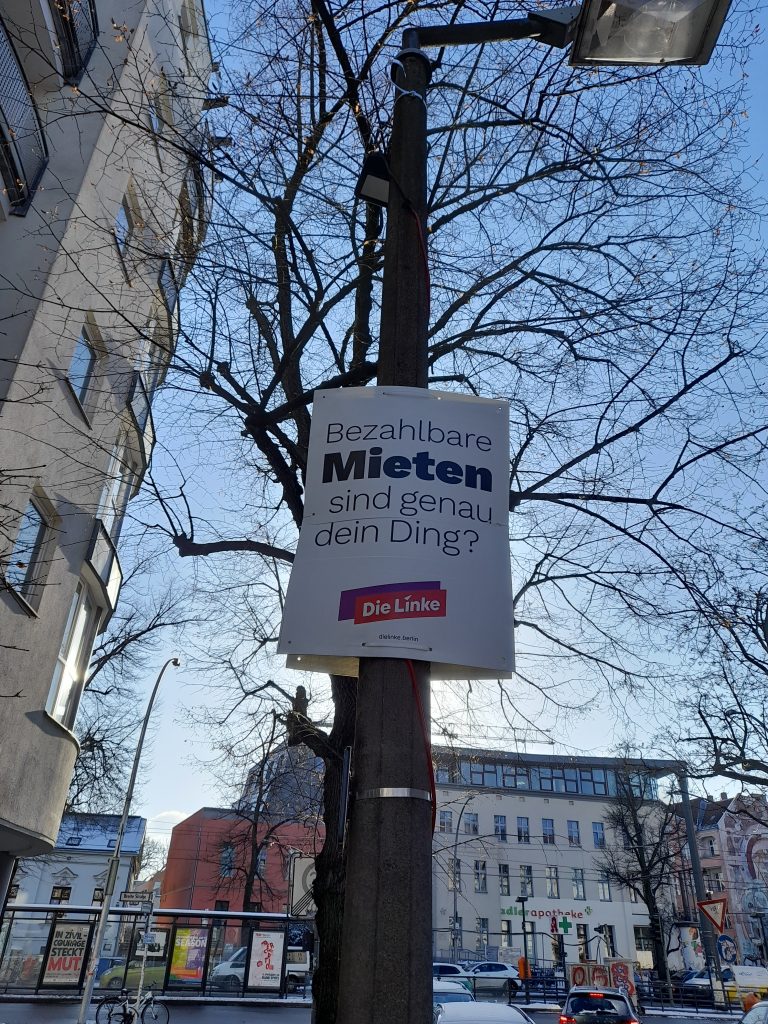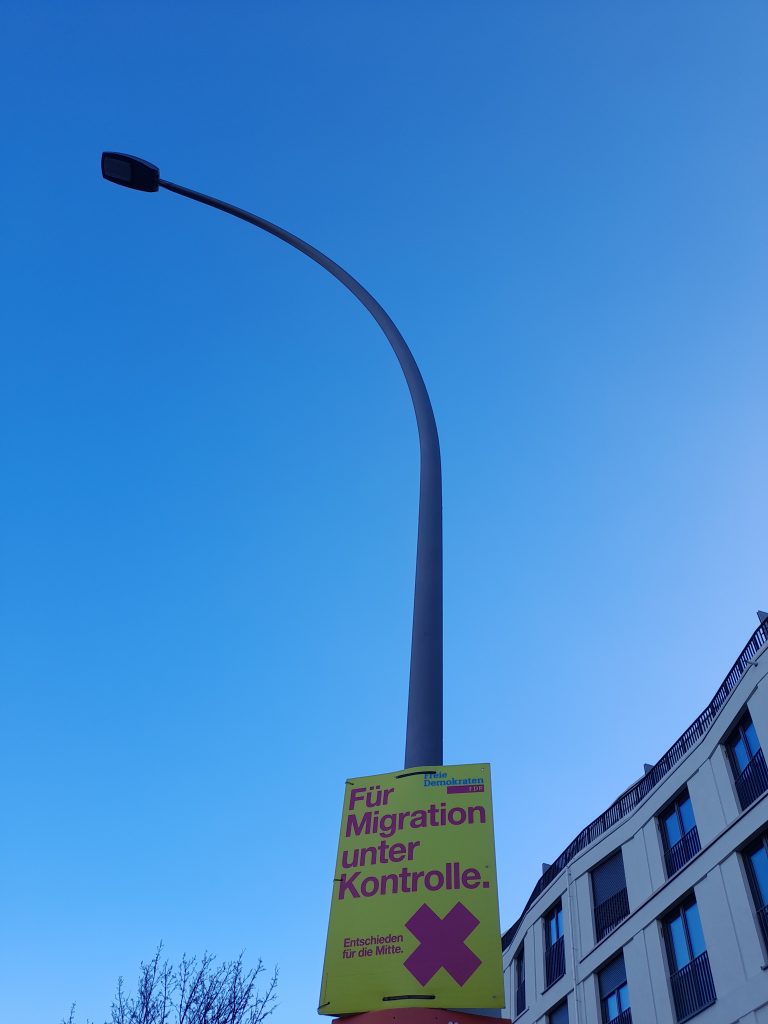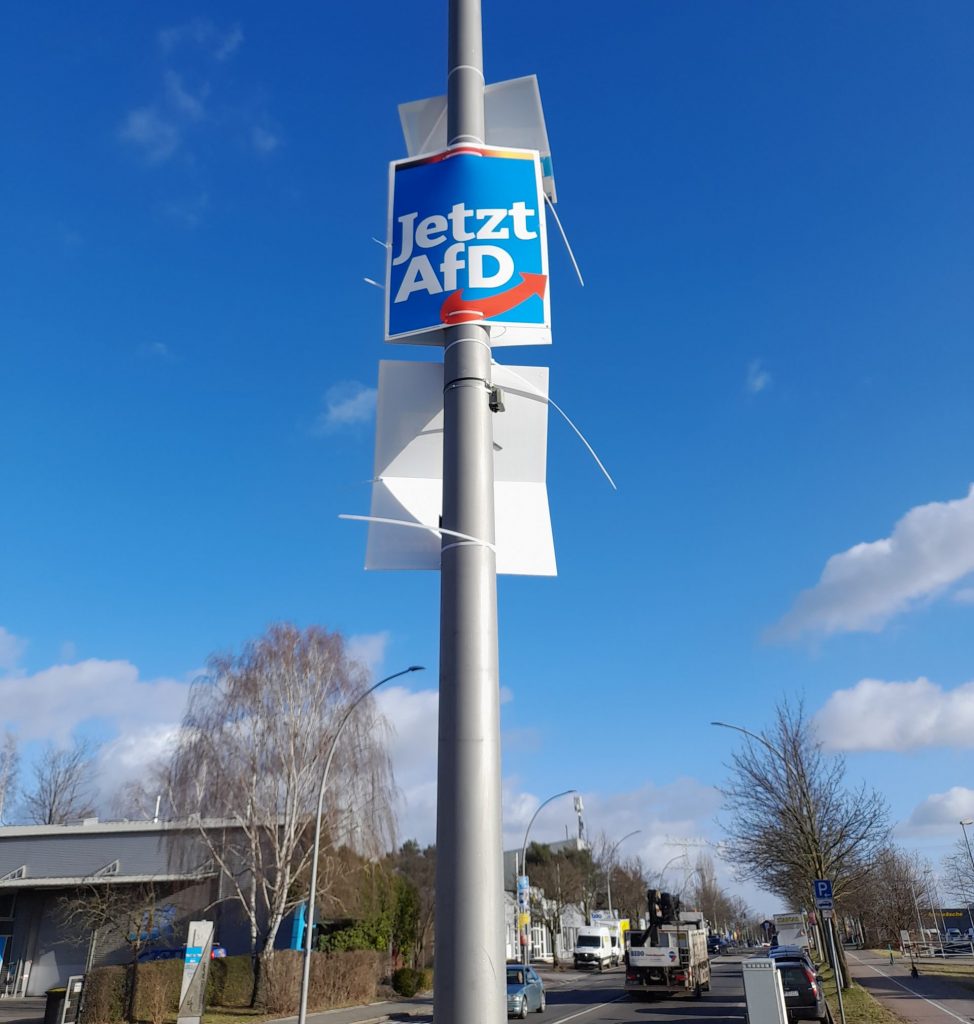German Political Parties by their Posters

The poster reflects orientation towards the future. SPD is the major party of the political Left, whose basic belief is that the future is everything. Do you find life difficult? Restart! Are you dissatisfied with the government? Restart!
The idea stems from Jean Jaque Rousseau, who is famous for his statement: Man is born free, but everywhere you find him in chains! By extension: throw away the chains, and you have instant freedom! Rousseau is, by the way, infamous for how he treated his own children. He forced their mother to send them away – no „noisy“ children should disturb the genius’ work on great ideas. The conservative alternative to this is: humans grow into existence. Unless you are born by a mother, unless you grow up in a community with others, learning a language and some values – then you simply don’t exist. You see, conservatives sometimes think more in social terms than socialists.
Note that the poster refers to a federal election and the SPD itself is a coalition partner of the government. A vote for SPD will NOT lead to change. However, this does not prevent the party from appealing to the dream of instant freedom by restarting the world.

This is he materialist party. Life is quite straightforward – about money and what money can buy, or at least this is what politics is about. At the core of material life are your body and your home. You already have a body; and WE will give you an affordable home.
The root of this thinking is, of course, Karl Marx. He taught that economy rules.
You can then ask why bother with politics at all? This is an intrinsic doubt embedded in Marxist politics. So, in the same party in addition to the materialist perspective, you find the opposite. Capitalists are seen as egoistic “homo economicus” not even worth discussing with, but the proletariat is seen as destined for historical heroism lead by also heroic leaders. Oscar La Fontaine did commit his life to Die Linke, and so did Gregor Gyrsi and Sarah Waagenknecht (the latter now out). This spiritual aspect of Die Linke I find quite religious.
According to the American catholic Bishop Baron, Karl Marx was the first of four major philosophers denying the spiritual nature of humans. After Marx followed Nietzsche, Satre and Foucault.
But I will say, that even in a Marxist party the spiritual aspect of life did remain for a long time, camouflaged as class heroism. Today, however, this may have changed. More about that in the next section.

The Green Party is now the really religious party. HALT – this word translates into safety, support and STOP – all characteristic of the Green value system. What religion, family and community used to provide; you can now have by joining The Green. If life is difficult – hold on to God – or to Green! In times of crisis, cling to The Father, The Son and The Holy Spirit – or to Baerbock and Habeck!
Note that “Halt” is something you will give – but as a member of the community you will also receive. There is no clear give and take – rather “halt” is something floating in the community. This provides a feminine flavour to the Green in contrast to the masculine heroism of The Left Party.
Another religious aspect: No other party is so willing to sacrifice as The Green – once a Christian virtue. The Green willingly sacrifice nuclear Power at a time of peak energy prices. They accept the blowing up of the North stream pipeline for the presumed squeeze of Russia. They accept economic decline for the presumed salvation of the planet’s climate. They sacrifice the woods and fields landscape of Germany for a windmill forest.
I suppose for moral reasons, they also support the war against Russia. Zelensky and his government are seen as morally superior to Putin’s Russia.
However, in Germany as many as 85 % support the current peasants’ protests. The Greens have reasons to be nervous.

In the photo, you cannot read what is behind the bin. But never mind. There is no information about the party there, just the long and slightly aristocratic name of the candidate. The election candidate looks a bit conservative and so does the party.
But what does the party mean? Hard to say, after Angela Merkel left. In the time of Merkel, the party meant what Merkel meant. And Merkel meant what was appropriate. Merkel took on the position of “Landesmutter”. When CDU in 2014 gave way to SPD’s claim for a minimum wage, voters even attributed this success of SPD to Merkel. Some people like to have a “Landesmutter”.
Doing what is “appropriate” kind of worked as a policy for 16 years. But after 16 years of basically no policy, reality catches up. Russia, sick of the West’s disrespect, ultimately went to war. Energy prices surge after 10 years of fearful nuclear shut-downs. Voters outside the laptop-class itself look for someone who cares for people living in the world outside seminars.
I have not tried to read the programme of the CDU, but I have heard one analyst commenting that Merkel was good at one thing – keeping everybody around her down. That is mediocracy. I must say I didn’t notice this while she was in power, but we can now see the result: there are nobody there. CDU has zero leaders to offer. Just after she left, there was a brief competition between the two cleverest “boys” of her class (Söder and Laschet). Now there is not even that.
What we can learn from this, is that, even being conservative, you need governance. Education must be planned – and also economic development, especially in a time of transition from production of material goods to something else. To find out how work, business and life should be in a post-industrial society, takes some ideas, some thinking and careful governance. CDU, however, is taking us nowhere.

This is the party traditionally in the middle. A difficult place in times of polarization. Even the competent and smart party leader and finance minister Christian Lindtner may not be able to survive. The poster above is very smart indeed. You are both positive and negative to immigration: FOR immigration UNDER controle.
In no other country has compromise been so strongly praised and pursued as in Germany after 1945. However, even compromise has its limits. If you always compromise, you end up losing yourself. If everybody looks for compromise, nobody looks at the horizon. Political agents become shallow, short-sighted and even in a sense unreal.
This is where we are today. The FDP used to thrive under political fighting on a moderate scale internally as well as externally. Internally, there used to be a tug-of-war between a branch focussed on building a just society by law, and another branch focussing on economic liberalism. Externally, there were SPD to the left seeking economic equality and CDU to the right seeking economic growth. Those political tensions sort of brought society forward for some decades. FDP enjoyed its place in the middle. Their most well-known leader, Hans-Dietrich Genscher (1927-2016), was famous for never letting himself being pinned to any political opinion.
But what now? When the class struggle labour against capital has long been settled by compromise, what are politics about? A competition on being the best administrator? But the odd thing is that at the same time as politics „descends“ to administration it „ascends“ to religion. We have two opposite trends at the same time! Real religion has long been driven out of the common public sentiment, leaving a vacuum. The political parties and other agents take up issues which are a matter of belief rather than a matter of state power. For instance, the character and the position of the two sexes and the value of industry versus the value of nature.
Returning to FDP, they got 11,5 % by the latest election in 2021 and polls 4,8 % today. The lamppost over the FDP poster on the photo can be seen as a steep downward curve.

Flying a bit high (possibly in order to avoid vandalism) AfD’s poster proudly announces its message: NOW! This is a message of protest.
But AfD also has posters with a substance. In fact, like other parties, AfD has a comprehensive programme, and in its case, roughly resembling the center-right CDU 30 years ago. But in the meantime, society has changed. In fact, I will say that society has changed to an extreme degree. This makes a party resembling CDU 30 years ago look “extreme” today.
For one extreme change of society, I hold the degree of immigration. The quantity as well as the cultural variance has grown extremely. For a second important change I hold the position of the sexes. Equality regarding the sexes is now so understood, that both sexes are practically ignored. Moreover, there is a connection between the two changes: Nothing is more characteristic of any culture than how it deals with the sexes, and nothing is more decisive for the position of the sexes than culture, tradition and religion.
A society in extreme flux can explode, or more likely: implode. The AfD wants to stop and, if possible, reverse the trend. People vote AfD because they want to be a man (or a woman) in one culture.
Schreibe einen Kommentar